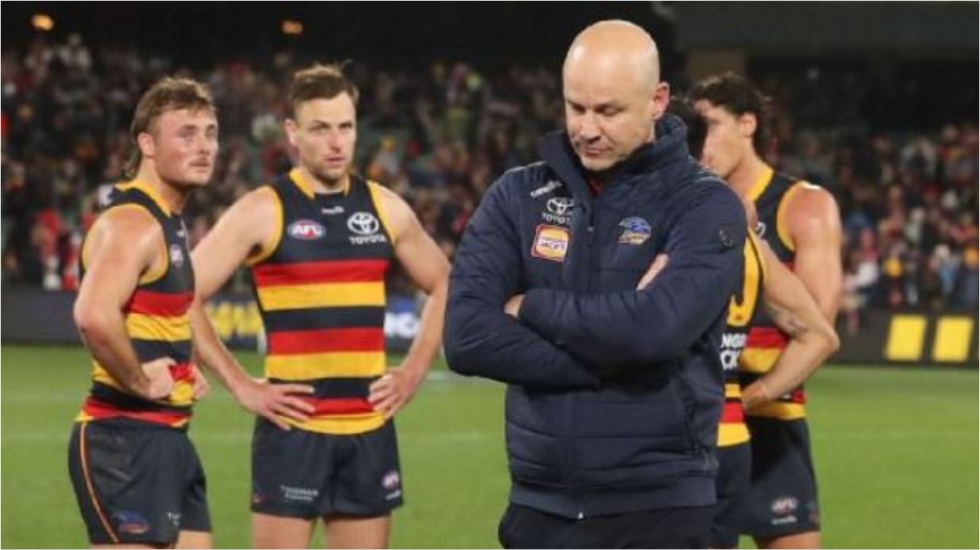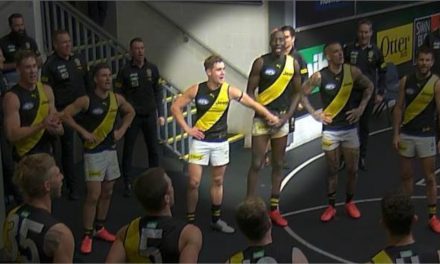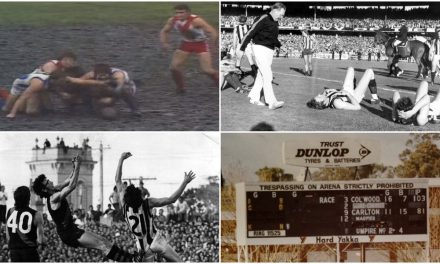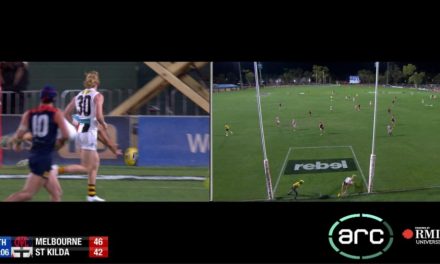Dejected Crows and their coach Matthew Nicks after Adelaide’s controversial loss to Sydney last week. Photo: AFL MEDIA
We seem to talk a fair bit about unintended consequences in AFL football these days, which always makes me think of a line from a favourite old English comedy series “Blackadder”.
As the hapless Baldrick launches into yet another inevitably dim-witted “cunning plan”, a resigned Blackadder gets in early: “Yes Baldrick, let us not forget that you tried to solve the problem of your mother’s low ceiling by cutting off her head.”
It’s too tempting to speculate about just whom might be playing those roles at AFL headquarters, but I feel like the Baldrick principle is very much at work when it comes to both the continuing furore over last week’s goal umpiring stuff-up in Adelaide, and the pre-finals bye.
Let’s start with the debacle at Adelaide Oval last Saturday night.
There’s been so many installments in the aftermath of Ben Keays’s “goal” for the Crows against Sydney it’s hard to keep up, and they’re still coming, the AFL on Thursday telling media that during finals it would have extra communication between goal umpires and officials in the ARC (AFL Review Centre) to ensure potential reviews aren’t overlooked.\
Unintended consequences, you ask? Well, on a broad level, there’s the fact that a video review system designed to reduce controversy seems to actually have created more, last Saturday night more proof that no amount of technology can eliminate human error.
More specifically, how about the fact that despite the initial implementation of video reviews in 2012, and a much-touted upgrading to the ARC in 2019, it seems no one at any stage appeared to stop and think about the importance of reviewing all scores, not just the goals.
Why not? Well, because there’s a gap of nearly a minute before a restart after a goal is kicked, whereas the average pause of play after a behind is signalled these days is only about six seconds.
Earlier this week, it was reported that the AFL had considered delaying restarts by a few more seconds to allow reviewers more time to look at potentially incorrect calls of behinds.
Ironic, considering the rules had always allowed for that possibility, because players weren’t allowed to kick-in from a behind until the goal umpire had finished waving their flag to signal the score.
That, however, was a rule dispensed with in 2006 in the interests of a faster game and fewer stoppages. Fair enough at the time, perhaps. But what about after score reviews were introduced?
What’s becoming increasingly obvious is that prior to the advent of score reviews, then after they became part of the game, then in the seven years from then until the supposedly game-changing ARC in 2019, and now in four years since, no one has “war gamed” every possible scenario which could occur involving a potential review.
PLEASE HELP US CONTINUE TO THRIVE BY BECOMING AN OFFICIAL FOOTYOLOGY PATRON. JUST CLICK THIS LINK.
How, possibly, could they argue otherwise? Had that been the case, someone, be it the field umpire on Saturday night, the officials in the ARC or the goal umpire himself, would have called that review and Keay’s behind would have correctly been called a goal.
Unintended consequences? Well, Adelaide missing the finals seems like a pretty important one. Now, how about the pre-finals bye?
Well, perhaps ironically seeing it isn’t in finals contention, Geelong’s decision this week to pack some of its very best off for post-season surgery rather than play the final game against the Western Bulldogs had me again pondering the futility of that little exercise.
What does it have to do with unintended consequences? Plenty, when you remember that the entire rationale (whether stated publicly or not) for the pre-finals bye was to prevent finals-bound teams whose positions were locked in resting a score of players in the final, effectively meaningless game, thus potentially affecting wagering.
But if potential legal issues around betting being compromised by a lack of selection integrity is the motivation, does it matter whether the game is one with finals riding on it or not? And finals chances are indeed riding on it for the Western Bulldogs, who suddenly have far greater prospects of winning their first game at GMHBA Stadium in 20 years.
It happens. In other codes, they call it player management and no one bats an eyelid. But after just a few examples of players being rested en masse between 2013-15 involving Fremantle and North Melbourne, the AFL decided to crack the walnut with the proverbial sledgehammer. And the impact?
Well, the momentum of the season is now halted when it should be building to a crescendo. Far more importantly, though, the supposed advantage of top four teams who win their qualifying finals has been, going on the numbers, dramatically eroded.
Between 2007-15, no fewer than 17 of 18 qualifying final winners went on to win their preliminary finals. Since then, in six years of the pre-finals bye (remembering in 2021 the bye was shifted to pre-grand final) just 50 per cent of qualifying final winners have won their preliminary final.
Too many of them have become sitting ducks because they’d played far too little football, usually just one game in 27-odd days (29 days in Collingwood’s case in 2019). Will we see another example in a few weeks.
Now there is serious discussion about making the pre-finals bye a pre-grand final bye, which happened two years ago in Perth only because of Covid considerations.
Yes, that could help a player in concussion protocols and others with niggles get up for the biggest game of the season. But will the AFL consider all the potential ramifications and avoid yet more unintended consequences before making the call? Recent history doesn’t leave one too hopeful.
Maybe, like Baldrick, they too will come up with a cunning plan, heaven forbid.
This article first appeared at ESPN.












It does seem to me that another question the AFL never ask themselves when getting rid of a rule is, “Why was it there in the first place?”
Take the bounce, for example. Look at some bounces from the 60s. They went all over the place. Why? Because that was the point. Randomness to restart the game. St Kilda don’t win a flag in 1966 without it.